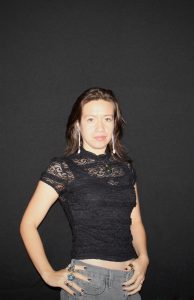
Composer Tania Rubio from Mexico came to Frankfurt in 2019!
For the fourth time since 2009, the International Working Group Women and Music e. V./Internationaler Arbeitskreis Frau und Musik e. V., in cooperation with the Frankfurt University of Music and Performing Arts (HfMDK), and the Institute for Contemporary Music (IzM), awarded its three-month international working sponsorship Composer in Residence.
Tradition and Modernity
57 female composers from over 28 countries applied for the 2019 scholarship. Tania Rubio (31) from Mexico convinced the jury members: Linda Horowitz (conductor/IAK), Annesley Black (composer/IzM), Stefan Fricke (Hessischer Rundfunk), Katharina Deserno (cellist) and Hannes Seidl (composer), among others, with her original and versatile compositions. Her aesthetic approach, influenced by her Mexican origins, brings new ideas to Europe: rituals, myths, sounds of nature, symbols, and landscapes find their way into her music. She uses a variety of timbres, images, media, and materials. In her compositions, she juxtaposes electronics, sounds of nature, and Western instruments, along with traditional South American instruments.
Network use
Tania Rubio began the working phase in Frankfurt am Main at the end of July. The archive and the HfMDK offered the composer the unique opportunity to use their resources, such as the university’s own studio for electronic music and acoustics, as well as the international women’s music network.
Tania Rubio composed a new work during her stay in Frankfurt and practised it with HfMDK students. In addition, a school class from the HfMDK’s Response school project developed a musical response to one of her existing works under her guidance. They were accompanied by Response team member Nicola Vock, a freelance double bass player. The works were performed at a portrait concert at the HfMDK on 17 October 2019 at 7 pm to mark the end of Rubio’s Frankfurt residency.
The project was supported by the Frankfurt-based Maecenia Foundation for Women in Science and the Arts, the Hessian Ministry of Science and the Arts, the cities of Frankfurt am Main and Kassel, and the Mariann Steegmann Foundation.

